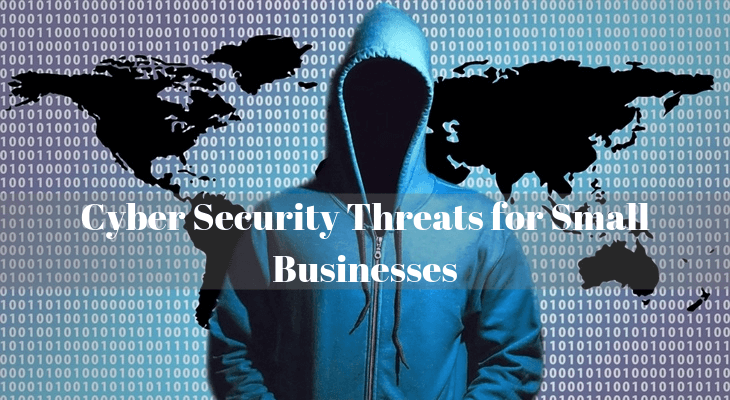Hello!
 Small businesses may not have to worry much about large-scale cyber terrorism efforts, but they are vulnerable to breaches. Hacks can cost a fortune in repairs and fines. They also scare customers away.
Small businesses may not have to worry much about large-scale cyber terrorism efforts, but they are vulnerable to breaches. Hacks can cost a fortune in repairs and fines. They also scare customers away.
With the right precautions, you can avoid them. In this article, we take a look at how you can protect your small business against cyber threats.
Outdated Systems
Regularly updating your technology is key to keeping your system secure. For one thing, outdated firewalls may simply not perform to the standards that they used to. They need to be maintained to guarantee even the same level of functionality they had when they were first downloaded.
Cyber threats are also constantly evolving. A cyber security strategy that was developed ten years ago might not be relevant today. Hacker methods change. This means that security methods have to change as well to keep systems safe.
Bad Password Hygiene
 Passwords are a tricky thing. Everyone has a few dozen of them. It’s impossible to keep track of every password, leaving many to rely on autofill, or simply writing them down somewhere.
Passwords are a tricky thing. Everyone has a few dozen of them. It’s impossible to keep track of every password, leaving many to rely on autofill, or simply writing them down somewhere.
While these strategies might work for protecting accounts that don’t contain particularly sensitive information, they should not be used at your business.
Good password protection strategies involve multiple verification steps, automated sign-outs to ensure that accounts aren’t left open indefinitely, and password strength requisites that ensure the information can’t be easily accessed by an outside party.
Inconvenient? Perhaps. But a similar level of security is typically applied to keeping physical business locations secure. You lock your doors. You make keys that only authorized personnel are allowed to access. You might even have a security system and cameras to prevent break-ins.
This same presence of mind should be applied to password protection.
Phishing
 Everyone gets phishing emails.
Everyone gets phishing emails.
If you take a look at your spam folder, you will probably find that you are getting many every day. Most people know not to open them, but every once in a while, one gets past the goalie.
While it may seem like an innocuous threat, phishing emails have been the cause of many significant breaches over the years, most notably the large Marriott breach that saw hundreds of millions of people experience compromises to their personal information.
Phishing emails can be avoided through proper training and constant vigilance.
Malware
Malware, like phishing emails, is a constant threat that your system probably interacts with routinely, all without you even realizing it. You know not to go to suspicious sites, or open strange links, and yet every once and a while, mistakes get made anyway.
As with phishing emails, awareness and best practices are the easiest way to protect against malware. You also need to keep your cyber security systems updated. Anti-malware software not only protects against threats, but it also usually allows you to avoid them entirely by identifying fishy sites and troublesome links.
Poor Staff Training
Poor staff training can undermind even the best intentions. If you follow all cyber security practices closely but your staff does not, the damage will be as just as bad. You can address this concern with regular training, and by emphasizing the importance of cyber security within your business.
Make sure the members of your staff understand why you make certain decisions, what the threats are, and how they can help your business avoid them. The vast majority of team members will be happy to comply, especially when they understand the reason behind your rules.
Mobile Technology
 Mobile technology includes anything from wearables to tablets and phones. You probably have a security system in place for your work computer, but are you applying the same caution to your mobile devices?
Mobile technology includes anything from wearables to tablets and phones. You probably have a security system in place for your work computer, but are you applying the same caution to your mobile devices?
If you put business information on your phone or tablet, you need to make sure that it is just as secure as your work computer. This means applying the same security measures described above to your devices.
Protect them with good passwords, avoid mysterious emails and unsafe sites, and stay away from insecure wifi connection points.
Keep in mind that a bad actor can easily infiltrate your entire system by way of your phone or tablet.
IoT
Finally, IoT. The Internet of Things is at once popular and largely misunderstood. Smart devices of any kind fall into this category. Your smart thermostat, smart toaster, smart anything. IoT can be a convenient way to automate certain tasks around your home or business.
However, this new and rapidly growing technology remains vulnerable to system compromises. Hackers can use IoT as a point of entry into larger systems. Does this mean you should forgo smart devices entirely?
Not necessarily. If IoT is an important element of your business or lifestyle, you can make it compatible with cyber security by implementing best practices and by making sure your entire staff is aware of best practices.
Getting Extra Help
 Cyber security professionals can help you with all of the concerns listed above.
Cyber security professionals can help you with all of the concerns listed above.
An analyst will come in, test your system, identify points where you are vulnerable, and make updates and recommendations. They often do this by testing your system the same way that hackers do, attempting to get in, and telling you how they did it.
Cyber security analysts are expensive to hire, but they are cost-effective in the long run. Security breaches can set businesses back many months, costing a fortune to repair, and resulting in a loss of business from customers who worry their information might not be safe.
With the right steps, you can avoid threats and keep your and your customer’s data secure.
Thank you!
Join us on social media!
See you!






